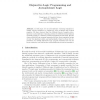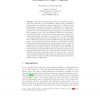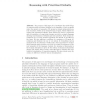120
click to vote
LPKR
1997
Springer
15 years 6 months ago
1997
Springer
In this paper, we use autoepistemic reasoning semantics to classify various semantics for disjunctive logic programs with default negation. We have observed that two different typ...
172
click to vote
LPKR
1997
Springer
15 years 6 months ago
1997
Springer
Abstract. We study the relationship between argumentation (abduction) and disjunctive logic programming. Based on the paradigm of argumentation, an abductive semantic framework for...
118
click to vote
LPKR
1997
Springer
15 years 6 months ago
1997
Springer
Abstract. Recently the field of theory update has seen some improvement, in what concerns model updating, by allowing updates to be specified by so-called revision programs. The ...
135
click to vote
LPKR
1997
Springer
15 years 6 months ago
1997
Springer
We present the system LAP (Learning Abductive Programs) that is able to learn abductive logic programs from examples and from a background abductive theory. A new type of induction...
117
click to vote
LPKR
1997
Springer
15 years 6 months ago
1997
Springer
Abstract. This paper presents an extension of disjunctive datalog (Datalog∨ ) by nested rules. Nested rules are (disjunctive) rules where elements of the head may be also rules. ...
136
click to vote
LPKR
1997
Springer
15 years 6 months ago
1997
Springer
The purpose of this paper is to investigate the methodology of reasoning with prioritized defaults in the language of logic programs under the answer set semantics. We present a do...
120
click to vote
LPKR
1997
Springer
15 years 6 months ago
1997
Springer
In this overview we show how Knowledge Representation (KR) can be done with the help of generalized logic programs. We start by introducing the core of PROLOG, which is based on de...



